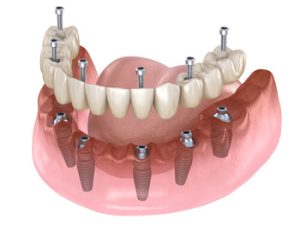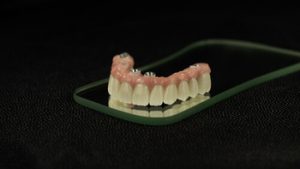Full-mouth dental implants might seem financially daunting when looking for affordable dental treatments. With the high popularity of dental tourism, many consider seeking dental implant procedures abroad in locations like Bali, Indonesia. But is this a truly cost-effective choice? Let’s explore the full-mouth dental implant cost in Bali compared to Australia and why Australian dental clinics may be the better choice for long-term dental health and quality.
Why Full Mouth Dental Implants?
Full-mouth dental implants offer an ideal solution for individuals who have lost most or all of their natural teeth. Unlike dentures, which may slip or cause discomfort, dental implants are a permanent, stable solution that matches the appearance and function of natural teeth. This complex dental procedure involves embedding artificial teeth into the jawbone, ensuring longevity and a natural appearance.
Key Factors That Impact the Cost of Full Mouth Dental Implants
The cost of dental implants varies due to factors such as:
- Type of implant treatment (e.g., single dental implant or just four implants)
- The treating dentist’s expertise
- Dental implant materials used
- Bone grafting or additional procedures
- Post-operative care and recovery
While dental treatments in Bali can initially appear cheaper, there are essential aspects to consider when comparing costs and quality.
What is a dental implant?
A dental implant is a synthetic tooth root surgically fixed into the jawbone to support a replacement tooth or bridge. It serves as a durable foundation for fixed or removable artificial teeth designed to blend seamlessly with natural teeth. Dental implants are fabricated from titanium or other biocompatible materials that integrate with the jawbone through a process called osseointegration.
- Implant Post: The screw-like structure that acts as the artificial root.
- Abutment: The connector that holds and supports the artificial tooth or crown.
- Crown: The visible portion of the artificial tooth that is custom-made to match natural teeth’ shape, size, and colour.
Dental implants are well-regarded for their long-lasting durability, natural appearance, and capacity to improve oral function and aesthetics. They can substitute for a single missing tooth or multiple teeth or even support a full set of dentures for those who need full mouth reconstruction.
Full Mouth Dental Implants Cost in Bali
Bali has become a hotspot for dental tourists seeking significant savings on full-mouth dental implants. Indonesian dental clinics often offer affordable dental implants at a fraction of the cost you would expect to pay in Australia. Prices for full-mouth dental implants in Bali can start at 10,000 AUD, though actual dental implant costs can vary based on the chosen clinic and specific treatment requirements.
Many dental clinics in Bali advertise affordable rates, promising experienced dentists and comprehensive dental treatment. The reduced cost is enticing, especially for dental tourists seeking dental implant surgery and other dental procedures while enjoying a tropical vacation.
The True Cost: Quality and Risks
However, while the initial consultation and treatment cost may seem appealing, dental implants abroad come with considerations that can impact long-term dental health.
Quality of Implant Materials:
The materials used for dental implants in Bali may not always meet the same high standards as those in Australia. Lower-grade materials can lead to quicker wear, potential rejection by the body, and a higher risk of complications over time.
Verification of Credentials:
While Bali boasts many skilled dentists, it can be challenging to verify their credentials or ensure they meet the strict training and certification standards of Australian dental practitioners. This can affect the overall quality and safety of the procedure.
Limited Post-Operative Care:
Comprehensive post-operative dental care is essential for the success of dental implants. In Bali, follow-up visits and long-term care may not be as easily accessible or thorough, raising the likelihood of complications, including infection, poor healing, or implant failure.
Potential for Hidden Costs:
Initial advertised prices may not include essential follow-up appointments, additional procedures (e.g., bone grafting), or the management of complications. Patients may incur unexpected costs, which can negate the initial savings.
Insurance Coverage Limitations:
Dental treatments performed overseas may not be covered by Australian health insurance, leaving patients responsible for the full cost of any corrective treatments needed upon return.
Increased Risk of Implant Failure:
Without proper post-operative care and continuous monitoring, the risk of implant failure increases. Immediate access to your original treating dentist in the event of complications is often limited with overseas treatments.
Sterilisation and Infection Control Standards:
Sterilisation and infection control practices may vary from one clinic to another. Ensuring the same rigorous standards as those mandated in Australia can be difficult, posing a risk of post-surgical infections and complications.
Communication Barriers:
Language barriers or differences in communication practices can lead to misunderstandings about treatment plans, post-operative care instructions, and potential risks.
Legal Protections and Recourse:
In case of a dispute or malpractice, patients may face challenges navigating the legal system in Bali, which may not offer the same protections as Australian consumer laws. This could make seeking reparations or corrective action more difficult.
Potential Incompatibility with Australian Follow-Up Care:
Some dental implant procedures performed abroad may not align with Australian standards or the preferred methods used by local dentists. This can complicate follow-up care and any future dental work needed.
Distance and Travel for Follow-Up:
If complications arise after returning to Australia, patients may need to travel back to Bali for resolution, incurring significant additional expenses and time.
Variability in Training and Experience:
The training and experience levels of dentists in Bali can vary widely. Ensuring that your treating dentist has extensive training in implant dentistry may require more effort and due diligence on the patient’s part.
Why Choosing Full Mouth Dental Implants in Australia Is Worth It
Choosing to undergo dental implant procedures in Australia, despite higher costs, comes with significant advantages:
High Quality Dental Treatments:
Australian dental clinics are held to stringent standards, ensuring high quality dental services. From initial consultation to the implant procedure, you’ll receive care from experienced dentists who are appropriately qualified.
Comprehensive Post-Operative Care:
Advanced Implant Dentistry:
Australian dental practices utilise advanced dental implant materials and the latest techniques in implant dentistry. This ensures not only the success of the procedure but also long-lasting results.
Better Transparency and Dental Payment Plans:
Australian dental clinics provide detailed cost breakdowns and transparent dental payment plans. Unlike some clinics abroad, Australian dental practices include hidden costs such as post-surgical consultations and necessary follow-up visits.
Strict Sterilisation and Infection Control:
Australian dental clinics adhere to rigorous sterilisation and infection control protocols. This minimises the risk of post-surgical infections and ensures a safe environment for patients.
Access to Advanced Technology:
Dental clinics in Australia often use state-of-the-art technology, such as 3D imaging and computer-aided design, to enhance the precision and success rate of implant procedures.
Tailored Treatment Plans:
Australian dentists take the time to create personalised treatment plans based on comprehensive assessments of medical history, oral health status, and specific needs, ensuring better outcomes.
Consistent Regulation and Oversight:
Dental practitioners in Australia are regulated by national bodies that maintain high standards of practice, ensuring that patients receive care from well-trained and qualified professionals.
Access to Multi-Disciplinary Teams:
Many Australian dental clinics collaborate with experts in various fields of dentistry to provide holistic treatment and care, which can be beneficial for complex procedures like full-mouth dental implants.
Legal Protections and Consumer Rights:
Patients in Australia are protected under robust consumer laws, ensuring that any disputes or issues with treatments can be addressed through clear legal channels and offering peace of mind.
Why Proper Oral Hygiene and Follow-Up Matter
Proper oral hygiene is mandatory for the success of any dental implant procedure. Australian clinics emphasise comprehensive post-surgical care and routine check-ups to monitor healing and implant stability. This is often lacking in overseas clinics, where follow-ups are limited to the patient’s stay.
An Overview of the Dental Implants Procedure:
Dental implant treatment is a multi-step process designed to restore missing teeth with durable, natural-looking replacements. From initial consultation to the final crown placement, the procedure involves precise planning and expert care to ensure long-lasting results and optimal oral health.
Initial Consultation and Planning
The process begins with an initial consultation with a dentist to evaluate your oral health and medical history and decide if you are a suitable candidate for dental implants. This stage often involves:
Dental Examination: Comprehensive examination, including X-rays or 3D imaging, to evaluate bone density and structure.
Treatment Plan: Customised treatment planning is based on specific needs, such as the number of implants required and any additional procedures (e.g., bone grafting).
Preparation and Bone Grafting (If Needed)
When a patient lacks adequate jawbone density, bone grafting might be necessary to create a strong base for the implant. This process involves placing bone material in the jaw and allowing it time to heal and fuse with the natural bone, which can take a few months.
Surgical Placement of the Implant
Anaesthesia: Local anaesthesia is used to numb the area, and sedation may be used to enhance patient comfort during the procedure.
Implant Insertion: The dentist makes a small incision in the gum to expose the bone. A hole is made into the jawbone, and the titanium implant post is placed securely.
Healing Period: The gum tissue is then stitched closed over the implant. The healing period, called osseointegration, allows the implant to bond with the bone, typically taking 3-6 months.
Placement of the Abutment
Once the implant has bonded with the jawbone, a minor surgical procedure is conducted to attach an abutment. This connector extends above the gum line and acts as the support for the artificial tooth or crown.
Crown Placement
Impressions: Impressions or digital scans are taken to create a customised crown that corresponds to the shape, size, and colour of your natural teeth.
Crown Attachment: The crown is either screwed or cemented onto the abutment, completing the dental implant process.
Post-Operative Care and Maintenance
After the procedure, patients may experience some discomfort, such as swelling, minor bleeding, or pain, which can be managed with medication. Proper oral hygiene and routine dental check-ups are important to ensure the implant stays healthy and functional.
How full mouth dental implants compare to removable dentures
When comparing full-mouth dental implants to removable dentures, several key differences arise in terms of comfort, durability, functionality, and overall oral health benefits. Here’s how they stack up:
Stability and Functionality
Full Mouth Dental Implants: These implants are anchored directly into the jawbone, offering superior stability. They function like natural teeth, allowing for confident eating, speaking, and laughing without the fear of slipping or shifting.
Removable Dentures: While modern dentures fit better than earlier models, they can still move or slip, especially when eating or speaking. Adhesives are often used to keep them in place, which may not always be reliable.
Comfort and Natural Feel
Full Mouth Dental Implants: Implants are designed to fuse with the jawbone, providing a more natural feel and comfort level similar to natural teeth. They don’t cause irritation to the gums or need removal.
Removable Dentures: Dentures can sometimes cause irritation or soreness in the gums, especially if they don’t fit properly. They may also feel bulkier and less natural.
Oral Health Benefits
Full Mouth Dental Implants: Help maintain jawbone density through osseointegration (fusion with the bone), preventing bone loss and maintaining the normal shape of the face. Implants also stimulate the jawbone, similar to natural teeth, promoting overall oral health.
Removable Dentures: Can lead to gradual bone loss over time since they do not provide stimulation to the jawbone. This can result in facial structure changes, giving a sunken appearance over time.
Durability and Longevity
Full Mouth Dental Implants: With proper oral hygiene and regular dental check-ups, implants can last for decades, often providing a permanent solution to missing teeth.
Removable Dentures: Typically last between 5-8 years and need periodic adjustments or replacements due to changes in the shape of the mouth and bone loss over time.
Maintenance and Care
Full Mouth Dental Implants: Require maintenance similar to natural teeth, including daily brushing, flossing, and routine dental visits. They do not require special cleaning solutions or removal at night.
Removable Dentures: Need to be taken out nightly for cleaning and to let the gums rest. Special solutions and careful handling are necessary to prevent damage and maintain hygiene.
Comfort and Speech
Full Mouth Dental Implants: Because they are fixed in place, they do not affect speech or cause discomfort that might alter pronunciation or clarity.
Removable Dentures: May sometimes slip or move while speaking, affecting pronunciation and creating the need for readjustment, which can be frustrating for some users.
Cost Considerations
Full Mouth Dental Implants: These are more expensive upfront compared to dentures due to the complex procedures and high-quality materials involved. However, they can be more cost-effective over time because of their durability and minimal maintenance needs.
Removable Dentures: Generally more affordable initially, but ongoing costs for adjustments, replacements, and maintenance can add up over time.
Impact on Lifestyle
Removable Dentures: Often come with dietary limitations, as avoiding hard or sticky foods is necessary to prevent them from becoming dislodged or damaged. Users may also need to adapt to the inconvenience of cleaning and removing them nightly.
Final Thoughts: Investing in Your Dental Health
While seeking economic full mouth dental implants cost, Bali may seem appealing, however it’s critical to weigh the long-term advantages and potential drawbacks. Australian dental clinics provide an unmatched standard of care, ensuring your implant treatment is a safe and successful investment in your oral health. Opt for quality, safety, and comprehensive care that guarantees peace of mind—choose Australia for your dental implants.
Investing in full mouth dental implants is an investment in your well-being, confidence, and quality of life. Ensuring your treatment is handled by highly skilled Australian dentists, with proper follow-up and use of the highest quality materials, is invaluable for lasting results and your overall dental health.
If you have further questions or want to explore dental implant options in Australia, contact Dr Jack Yang at (02) 8806 3712 and (02) 9000 1778.
Note: Any surgical or invasive procedure carries risks. Before proceeding, you should seek a second opinion from an appropriately qualified health practitioner.
References:
Cleveland Clinic. (n.d.). Dental implants. https://my.clevelandclinic.org/health/treatments/10903-dental-implants
Brånemark, P.-I., Zarb, G. A., Albrektsson, T. (1985). Osseointegration: Its impact on the future of dental implantology. Journal of Prosthetic Dentistry, 50(5), 469-483. https://pmc.ncbi.nlm.nih.gov/articles/PMC3602536/
Healthline. (n.d.). Dental bone graft. https://www.healthline.com/health/dental-bone-graft
Perio-Implant Advisory. (n.d.). Dental implant failure: 3 common medical conditions that may affect success rates. https://www.perioimplantadvisory.com/clinical-tips/article/14073307/dental-implant-failure-3-common-medical-conditions-that-may-affect-success-rates
Forbes. (n.d.). How much dental implants cost. https://www.forbes.com/health/dental/how-much-dental-implants-cost/












